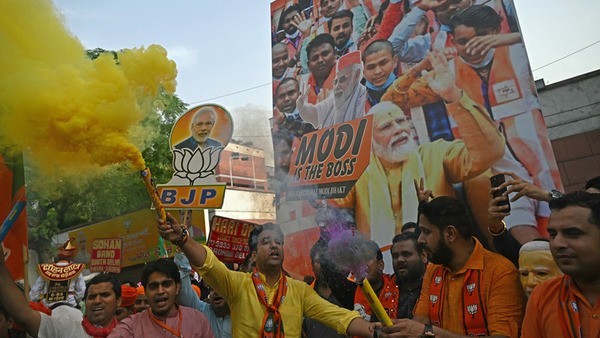Iran’s Plan to Strike Back Against the U.S.
Iran’s Military Preparations Following U.S. Attacks
Loading...

Politicians interviewed by the press before the announcement of election results believe that New Delhi's "strategic independence" approach will continue to be effective
India's foreign policy will remain unchanged regardless of who comes to power in the just-concluded elections, a senior diplomat told the press as the votes were counted on Sunday.
"All aspects of our foreign policy will remain the same," Manju Seth, India's former ambassador and consul general to Madagascar and Comoros, said. He said New Delhi will maintain its "strategic independence" and a "multilateral" approach to dealing with other countries. The former candidate said that India will continue to seek a permanent seat on the UN Security Council.
The beauty of India's national policy has not changed much. Ambassador Pinak Ranjan Chakravarty, the former secretary of the Ministry of External Affairs, said that since this was created for the national interest, it will not change, more or less it will not change. He added that "there will be no reform or change" in his country's policies.
India's elections are being closely watched around the world as many analysts believe that India's politics under the Modi government is more "confident". Recently, the South Asian country's policy on the world stage has been characterized by "balanced" relations with Moscow and its Western partners.
After the war in Ukraine broke out, India refused to criticize Russia, maintained defense and commercial ties, and increased oil sales despite Western scrutiny. India also emphasized the need to resolve the conflict peacefully through "dialogue and mediation".
New Delhi has strengthened its role on the world stage, and its economy has grown significantly: it has now reached $3.7 trillion, making it the fifth-largest economy in the world. world. By the end of the decade, the country is expected to overtake Germany and Japan to become the country's third-largest economy.
However, Manjuseth said there could be a "rethinking" of policies around the country if the Congress-led Alliance for National Development and Inclusion (or India) comes to power. , without providing any additional information.
New Delhi is committed to pursuing an "environment first" policy, which aims to strengthen political, trade and cooperation with other countries in the region such as Bangladesh, Bhutan, Maldives, Myanmar, Nepal, and Sri Lanka. While the Modi government maintains strong ties with most of its neighbours, relations with China and Pakistan - a long-standing border dispute - have soured. Smaller countries in the region are becoming increasingly sensitive to India's foreign policy as they grow closer to Beijing.
Whoever takes power and forms a government must be "extremely flexible" and shape his foreign policy approach based on the changing geopolitical environment, which is accelerating.
BMM - MBA
Iran’s Military Preparations Following U.S. Attacks
Troops remain in five strategic locations, raising fears of renewed tensions and long-term occupation.
Opposition forces have taken control of the capital after a significant offensive. Here is how it unravelled.
